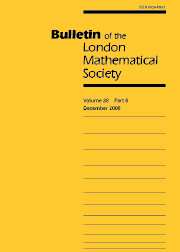Article contents
ON FUSION IN UNIPOTENT BLOCKS
Published online by Cambridge University Press: 01 March 1999
Abstract
The context of this note is as follows. One considers a connected reductive group G and a Frobenius endomorphism F[ratio ]G→G defining G over a finite field of order q. One denotes by GF the associated (finite) group of fixed points.
Let [lscr ] be a prime not dividing q. We are interested in the [lscr ]-blocks of the finite group GF. Such a block is called unipotent if there is a unipotent character (see, for instance, [6, Definition 12.1]) among its representations in characteristic zero. Roughly speaking, it is believed that the study of arbitrary blocks of GF might be reduced to unipotent blocks (see [2, Théorème 2.3], [5, Remark 3.6]). In view of certain conjectures about blocks (see, for instance, [9]), it would be interesting to further reduce the study of unipotent blocks to the study of principal blocks (blocks containing the trivial character). Our Theorem 7 is a step in that direction: we show that the local structure of any unipotent block of GF is very close to that of a principal block of a group of related type (notion of ‘control of fusion’, see [13, §49]).
- Type
- Notes and Papers
- Information
- Copyright
- © The London Mathematical Society 1999
- 3
- Cited by


